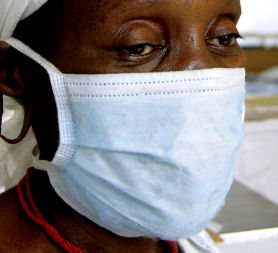London is TB capital of Western Europe
Britain is the only country in Western Europe with rising rates of TB. Cases are highest in London but one expert tells Channel 4 News it isn’t just a problem in the capital.

Tuberculosis (TB) was referred to as the “white plague” during Victorian times because sufferers’ skin tone turned so pale
More than 9,000 cases of TB are diagnosed a year in Britain and the problem is becoming particularly acute in London which accounts for 40 per cent of the nation’s total diagnosed cases.
Alimuddin Zumla, a global TB expert from University College London, said the situation in London was reminiscent of outbreaks of multi-drug resistant TB in prisons in the United States in the 1990s.
If someone is homeless then a cough which drags on for a bit isn’t going to be high on their list of priorities. Dr Marc Lipman
“Poor housing, inadequate ventilation, and overcrowding, conditions prevalent in Victorian Britain, are causes of the higher TB incidence rates in certain London boroughs,” he said in a commentary on the study, which was published in the Lancet Infectious Diseases journal.
He said that in Britain, as in all European countries, the disease was mainly concentrated in high-risk groups such as migrants, refugees, homeless people, drug users, prisoners, and people infected with the HIV virus that causes AIDS.
Not just a London problem
A report last month found that cases of tuberculosis in Britain reached their highest level for 30 years in 2009 with 9,040 cases, and the number of new drug-resistant TB cases had almost doubled in the past decade.
Although the number of new cases is highest in London, one expert told Channel 4 News that TB is also a problem in other English cities.
Dr Marc Lipman, a senior lecturer at University College London, said: “The key thing about London is that it acts as an indicator about what needs to be done.
“Because of the number of cases in London it is easier to spot a trend but when you look at other cities over a number of years you also see a rise in cases.”
Dr Lipman said public education is vital if the number of TB cases is to be reduced: “TB hasn’t gone away. People need to be aware of symptoms and have good health-seeking behaviour.
“If someone is homeless then a cough which drags on for a bit isn’t going to be high on their list of priorities.”
Public health problem
Up to a third of people worldwide are infected with the bacterium that causes TB, although only a small percentage ever develop the disease.
Studies show that people with substance abuse problems and those who live in hard-to-reach communities are more prone to the illness than the general population.
The AIDS epidemic drove up the number of TB cases across the world in the late 1980s and 1990s because the immune suppression caused by HIV can make a person far more susceptible to TB.
People can get drug-resistant forms of the TB either as a result of catching such a strain from another person or because of inappropriate or incomplete treatment.
This study found that the increase in the number of TB cases seen in Britain has largely been in non-UK born groups, but most of these were not in new migrants.
It said 85 per cent of cases born overseas had lived in Britain for two or more years and about half had lived here for five or more years – indicating that the disease is not being imported from elsewhere.




